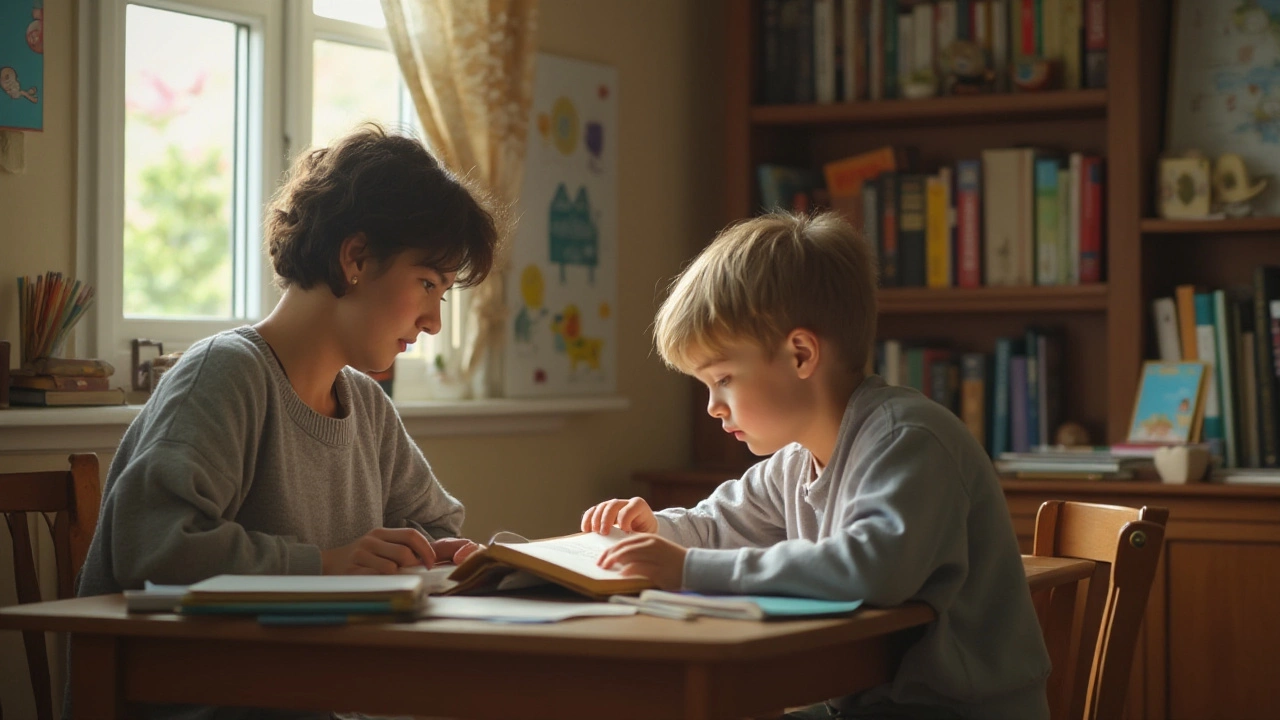In today's fast-paced educational environment, parents seek various ways to support their children's academic growth. Private tutoring has emerged as a popular option, promising individualized attention and curated learning experiences. But does it really help kids succeed?
Exploring the tangible benefits of tutoring, from improved grades to increased confidence, provides insight into its potential effectiveness. Yet, like any educational tool, tutoring is not without its challenges. Families must carefully weigh these to determine if it's the right path.
- Personalized Learning Experience
- Building Confidence and Motivation
- Challenges in Tutoring
- Evaluating Tutoring Success
- Choosing the Right Tutor
Personalized Learning Experience
One of the greatest advantages of private tutoring is the highly tailored experience it offers. In a classroom, teachers must cater to a large group, each with their unique learning styles and paces. This means that many students may not get the attention or assistance they need. A tutor provides a one-on-one personalized learning experience that can adapt closely to a child’s individual needs. Tutors have the flexibility to dive deeper into concepts where the student struggles and to move quickly through areas they master with ease.
This custom approach not only enhances understanding but also nurtures a love for learning. By focusing solely on the student, tutors can identify and develop skills that might otherwise be overlooked. For example, a child struggling with math fundamentals can receive targeted practice and explanatory techniques specifically designed to overcome those difficulties. And when subjects are connected with real-world applications that interest the child, learning becomes not just a duty, but an engaging adventure.
Private tutors often assess students’ learning styles before devising appropriate strategies. Some learners benefit from visual aids, such as diagrams and charts, while others may prefer a more discussion-based approach. Private tutoring empowers children by acknowledging and embracing these differences, turning challenges into opportunities for growth. This method of personalized attention can also help students build confidence, as they feel supported and guided in their learning endeavors.
Moreover, the nurturing environment of a tutoring session often fosters a positive student-tutor relationship, crucial for a child's educational and emotional development. The sense of trust and rapport that a tutor builds with their student can greatly enhance motivation and engagement. Kids who might feel hesitant to ask questions in a crowded classroom often find it much easier to voice their thoughts in a one-on-one setting, which is instrumental in overcoming academic blocks and anxieties.
According to educational psychologist Dr. Carol Dweck, "Students who receive personalized attention often develop a growth mindset, understanding that abilities can be developed through dedication and hard work."
The unique benefit of a personalized learning experience is its ability to help each child realize their full potential. Tutors can introduce advanced topics or enrichment activities for gifted students, preventing boredom and underachievement. Conversely, they can also slow down the pace for students who need more time to grasp the basics. This balanced approach enables every child to succeed at their pace, building a solid foundation for lifelong learning.
Building Confidence and Motivation
For many children, academic success is not just about mastering content but also about fostering a healthy sense of self-esteem and motivation. Private tutoring can play a vital role in this development by offering a supportive environment where kids feel more comfortable expressing their difficulties and triumphs. Unlike crowded classrooms, the one-on-one setting allows tutors to identify specific areas where a child may lack confidence. This individualized focus means children receive personalized strategies that reinforce their strengths, gradually building their belief in their abilities.
Another key aspect of tutoring is its ability to instill a love for learning, which serves as an intrinsic motivator. When children see learning as an enjoyable process rather than a chore, it changes their outlook on education. Tutors often incorporate elements that children are passionate about into their lessons, making subjects more relatable and engaging. This method not only boosts their motivation but also enhances retention of the material. For instance, a child fascinated by art might approach geometry more eagerly when concepts are intertwined with artistic examples.
"Someone believed in you. Cast the same shadow." - Oprah Winfrey
The relationship between tutor and student also plays a significant role in increasing confidence levels. A positive, encouraging tutoring relationship can offer the emotional safety net children need to take risks and make mistakes, which are crucial components of learning. A tutor who celebrates small victories and guides gently through setbacks contributes to molding a resilient learners' mindset. Success in these areas often translates back into the classroom where children feel more prepared to participate and take academic risks without fear.
Moreover, tutors are adept at teaching children how to set realistic goals and celebrate their progress. This process helps align their efforts with achievable aspirations, catalyzing their journey toward academic success. Goal-setting is a powerful motivation tool because it provides direction and a sense of accomplishment once milestones are met. As children witness their progress, they often become more invested in their studies because they see firsthand the fruits of their labor.
Lastly, it's important to consider the long-term benefits of conferring motivation and confidence through tutoring. These attributes often transcend academics, equipping children with the necessary skills to tackle future challenges. Confidence breeds curiosity and the courage to explore new ideas, driving personal growth and development. Similarly, motivation serves as the catalyst for a lifelong journey of learning and self-discovery. By tapping into these qualities, private tutoring becomes a valuable asset in a child’s educational journey beyond just improved grades.

Challenges in Tutoring
The path of private tutoring isn't always smooth and free of obstacles. In fact, achieving success in tutoring can come with its set of challenges that both parents and students need to be aware of. One major hurdle is accessibility. Not every family can afford the sometimes steep costs associated with quality tutoring services. The disparity in resources can lead to unequal education opportunities, leaving children in underprivileged situations at a disadvantage. This financial strain often makes private tutoring a luxury rather than a necessity, challenging its universal utility.
In addition to financial barriers, the time commitment required for effective tutoring can be daunting. Children today have packed schedules with school, extracurricular activities, and personal time, and adding tutoring sessions can create a hectic routine. The logistical issues of coordinating a suitable schedule may lead to burnout, potentially making children resentful rather than excited about learning. This scheduling conflict is a common complaint among families trying to juggle tutoring with numerous other responsibilities.
Another significant challenge is finding a tutor who matches the specific learning needs of a child. Every child learns differently, and the tutor must be able to adapt to various learning styles. An ill-fitted tutor may do more harm than good by not addressing the gaps in a child's understanding or teaching in a way that doesn’t resonate with the student. Effective communication between parents, students, and tutors is key, but it can sometimes be difficult to establish. Miscommunication may lead to setting unrealistic goals, causing frustration for everyone involved.
Even with an ideal tutor, measuring success in tutoring can be subjective. Academic improvements may not be as clear-cut as expected, leading parents to question their investment. As pointed out by educational psychologist Dr. Susan Jones, "Improvement in grades, while important, isn't the sole marker of success. A child may develop better problem-solving skills and increased confidence, which aren't easily measured but exceedingly valuable."
When you throw technology into the mix, new challenges arise. While online tutoring platforms have made education more accessible, they also come with their drawbacks. Issues such as internet connectivity, lack of digital literacy among younger students, and difficulty in engaging kids through screens can hamper the potential benefits of online tutoring. The technical difficulties can add another layer of stress to an already challenging task.
Finally, the ability to track progress and outcomes is often limited. Without the right tools or strategies, it becomes hard to provide tangible evidence of the improvement brought by tutoring. Parents and tutors may struggle to align on what constitutes progress, and this discrepancy can lead to dissatisfaction with the whole tutoring experience. A clear method of setting benchmarks and tracking achievements in a structured manner is essential, yet often overlooked.
Addressing these challenges requires a comprehensive approach where parents, tutors, and educational institutions work collaboratively. Solutions need tailored strategies considering each child’s individual needs, with a focus on overcoming the barriers that restrict access, engagement, and assessment in the world of tutoring.
Evaluating Tutoring Success
When it comes to private tutoring, determining its efficacy is crucial for parents and educators alike. The key to evaluating if tutoring is truly beneficial lies in understanding the overarching objectives each student has and how tutoring aligns with those goals. Success may manifest differently from one child to another, underlining the importance of personalized results in education. For many, improvements in grades and test scores are clear indicators of progress. However, these metrics often only capture a part of the picture. It's essential to consider factors like increased confidence, better study habits, and a deeper understanding of subject matter, which can all reflect significant strides made through tutoring.
One cannot overlook the role of feedback in gauging tutoring benefits. Thoughtful communication between students, tutors, and parents ensures that everyone is on the same page regarding educational objectives and progress. Regular feedback sessions can help adjust teaching strategies to better fit a child's needs. An overly rigid approach might not serve all students well. Instead, adaptive teaching methods that pivot based on feedback are often more effective. In some cases, tutors might introduce materials that test a child’s comprehension beyond standard tests, offering insights into areas that require even more support.
Data-driven approaches have also become popular as schools and private tutoring services strive to quantify success. Performance tracking tools can provide a more objective perspective, showing patterns that lead to improvement. For instance, a study by the National Education Association found that students who engaged in regular tutoring sessions improved their classroom performance by up to 60% over the course of an academic year. These insights can empower tutors and parents with information to make informed decisions about the direction of a tutoring program.
Dr. Sarah Levy from the Educational Research Institute noted, "While quantitative data is important, the qualitative improvements we observe—like a child's growing enthusiasm for learning—often hold the key to a tutor's real impact."Another significant aspect of evaluating success is the perception of the student. Children who feel more confident tackling challenging subjects are indicative of a positive tutoring experience. Emotional and social growth should not be underestimated, as they are crucial components of overall success in school. In essence, a well-rounded evaluation of tutoring success takes into account both academic achievements and personal development, ensuring a holistic approach to a child's educational journey.

Choosing the Right Tutor
Deciding on the ideal tutor for your child is both a science and an art. When seeking someone who can positively impact your child's upbringing, parents must weigh several factors. One crucial step is to inquire about the tutor's educational background and teaching experience. A solid understanding of the subject matter and previous success in guiding children are good indicators of a capable tutor. Teaching is more than just knowing facts; it requires the ability to communicate complex ideas in a simple, understandable way.
Compatibility between the tutor and student is another key consideration. A tutor might have impeccable credentials, but if their teaching style doesn’t resonate with your child's learning preferences, progress may be slow. An initial trial session might help determine whether the tutor's approach aligns with your child's needs. Additionally, maintaining a balance between friendliness and professionalism can create an engaging and productive learning environment that appeals to kids. As noted in an article by Education Week, "An effective tutor doesn't just teach, but inspires and motivates the learner."
The logistics of tutoring are equally important. Factors such as scheduling flexibility, location, and cost must align with your family's lifestyle and budget. Many parents turn to digital platforms, offering widespread access to tutors across the globe. These platforms also provide reviews and ratings from other parents, aiding in the decision-making process. Despite their advantages, in-person sessions remain the preference for some, facilitating more dynamic interactions between tutors and students. It's wise to deliberate whether it's feasible to commit long-term to regular sessions, considering not only finances but also the time it requires from your family routine.
Strong communication is vital between parents, tutors, and students. Setting clear goals and expectations from the onset allows the tutor to tailor their approach accordingly. Regular progress discussions can also provide insightful feedback, ensuring the tutoring sessions remain on track and beneficial. Keep in mind that patience is key; measurable progress might take time, but consistent effort from everyone involved is sure to pay off eventually. With the right choice, a tutor can complement the school’s learning, and at most, become a trusted mentor that significantly impacts a child's educational path.
